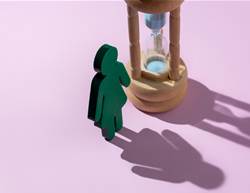For many women, reaching menopause is framed as the finish line. You get through the hot flushes, mood swings and brain fog of perimenopause and expect things to settle down. But for a growing number of women, the mental health challenges don’t end there—they begin a new chapter.
During a TV guesting, actress and lifestyle expert Valerie Bertinelli shared her experience navigating life eight years after menopause. She spoke candidly about her struggles, describing this period as “the most challenging, difficult, heartbreaking eight years” of her life.
Her honesty struck a chord with many women watching. As the host noted, “Nobody talks about how menopause could be harder to deal with than periods.” And that silence has left many women unprepared for what comes next.
Life After Menopause: What the Research Shows
While much of the conversation around menopause focuses on hot flushes and hormonal changes, there’s growing recognition of the impact on mental health—both during and after the transition.
Research shows depression is a common symptom of postmenopause, along with anxiety and mood disturbances. These changes are largely driven by declining oestrogen levels, which affect serotonin and other neurotransmitters involved in emotional regulation.
A study found that postmenopausal women were more likely to experience depressive symptoms than those in the pre- or perimenopausal stages. Loss of sleep, identity shifts, changing family dynamics and physical changes all contribute to what can feel like an emotional reckoning.
What No One Prepares You For
“I was like, ‘What is happening to my mental health?’” Bertinelli said, recalling her surprise at feeling worse than she ever did during PMS or earlier stages of menopause. She described experiencing brain fog so severe it interfered with her work and feeling emotionally overwhelmed long after her menstrual cycle had stopped.
While menopause symptoms are widely known, the emotional impact of the years that follow is rarely discussed. That leaves women without the language, tools or support they need to care for themselves during this time.
What Can Help
There’s no quick fix, but there are ways to manage and even thrive postmenopause. Mental health support, lifestyle shifts and hormonal therapy (if appropriate) can all play a role. Here are a few evidence-backed strategies:
- Prioritise sleep: Poor sleep is linked to depression and anxiety. Practice good sleep hygiene and speak with your doctor if you’re struggling to rest.
- Move daily: Exercise releases mood-boosting chemicals and improves sleep and energy levels.
- Seek support: Speaking with a GP or psychologist about your mood can help identify underlying issues and give you tools to cope.
- Limit alcohol: Research shows that alcohol can exacerbate anxiety and depression, particularly during hormone-related transitions.
- Create meaningful routines: Small, regular acts of self-care—like journaling, gardening or catching up with friends—can help anchor you emotionally.
Bertinelli credits her emotional recovery in part to choosing sobriety and prioritising what makes her genuinely happy. “Emotions are information,” she shared in an interview. “When I decided to really question why I was having a certain emotion, I was able to—most of the time—walk through it and get to the other side.”
The Bottom Line
Menopause doesn’t mark the end of emotional change—it may start a new season that’s just as complex and deserving of care. Talking about postmenopausal mental health is long overdue. Whether it’s brain fog that won’t lift or a low mood you can’t shake, what you’re feeling is valid and you’re not alone. By lifting the silence, we make space for women to feel supported, seen and empowered through every stage of life.










